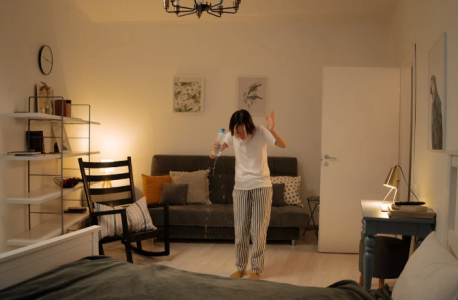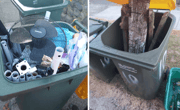How one tiny carpet stain led to a huge win for Aussie renters
By
Maan
- Replies 8
Disputes over rental bonds often spark confusion and frustration for tenants and landlords alike.
A recent case involving a seemingly minor issue has challenged common assumptions about tenant responsibilities when moving out.
The outcome of this dispute may change how lease agreements are interpreted across Tasmania.
Renters have secured a significant win following a recent bond dispute that revolved around what might seem a trivial issue—a ‘small yellow stain’ on a bedroom carpet. This case prompted a ruling that challenges the widespread assumption tenants must always have carpets professionally cleaned when vacating a property.
Instead, the Residential Tenancy Commission (RTC) clarified that tenants are only obliged to clean carpets if they leave them in a worse condition than at the start of their lease.
The requirement for tenants to arrange professional carpet cleaning has long been embedded in rental contracts, often included in the standard lease agreement issued by the Real Estate Institute of Tasmania.
Yet, this case—the first definitive ruling on the matter—exposed that such blanket clauses may be invalid. The RTC's decision emphasised that tenants are not responsible for cleaning carried out simply as ‘a matter of general practice as opposed to any real need or genuine failure of the tenant, in accordance with their obligations.’
Represented by the Tenants Union of Tasmania, the tenant at the centre of the dispute had rented a property in Burnie.
The matter came to a head over a tiny yellow stain on the carpet, which had not been documented in the condition report at the beginning of the lease.
No further photographic evidence of the carpet’s state at the end of the tenancy was provided, leading the commissioner to conclude the tenant was only liable for cleaning that specific stain.
The ruling awarded the property owner just $25 for carpet cleaning related to the stain, signalling that tenants cannot be held responsible for professional cleaning unless clear damage beyond fair wear and tear is proven.
Andrew Smith, senior solicitor at the Tenants Union shared: ‘It really shines a light that a blanket clause in standard tenancy agreements that says you have to have premises professionally cleaned is invalid.’
He added: ‘A tenant has the right not to do it, if they’ve left it in the same condition as when they moved in and there’s proof of that. So as always, tenants should take their own photos when moving in and carefully make any notes in any condition reports they (are) provided.’
Almost all real estate agents in Tasmania use the standard lease agreement referenced by the Real Estate Institute of Tasmania, and many private landlords and even some social housing providers follow the same template.
This ruling could have widespread implications for tenants and landlords across the state.
The case unfolded over what appeared to be a minor blemish, but its outcome may now shape future rental agreements and expectations, shifting some power back to tenants who maintain their properties responsibly.
The Real Estate Institute of Tasmania was contacted for comment.
This recent ruling has sparked plenty of debate about renters’ rights and the condition landlords can expect when tenants move out.
Watch this video to see just how challenging rental properties can get—and why understanding your rights matters more than ever.
Source: Youtube/Current Affair

With this landmark ruling now setting a precedent, how do you think it will change the way tenants and landlords handle bond disputes? Share your thoughts in the comments.
A recent case involving a seemingly minor issue has challenged common assumptions about tenant responsibilities when moving out.
The outcome of this dispute may change how lease agreements are interpreted across Tasmania.
Renters have secured a significant win following a recent bond dispute that revolved around what might seem a trivial issue—a ‘small yellow stain’ on a bedroom carpet. This case prompted a ruling that challenges the widespread assumption tenants must always have carpets professionally cleaned when vacating a property.
Instead, the Residential Tenancy Commission (RTC) clarified that tenants are only obliged to clean carpets if they leave them in a worse condition than at the start of their lease.
The requirement for tenants to arrange professional carpet cleaning has long been embedded in rental contracts, often included in the standard lease agreement issued by the Real Estate Institute of Tasmania.
Yet, this case—the first definitive ruling on the matter—exposed that such blanket clauses may be invalid. The RTC's decision emphasised that tenants are not responsible for cleaning carried out simply as ‘a matter of general practice as opposed to any real need or genuine failure of the tenant, in accordance with their obligations.’
Represented by the Tenants Union of Tasmania, the tenant at the centre of the dispute had rented a property in Burnie.
The matter came to a head over a tiny yellow stain on the carpet, which had not been documented in the condition report at the beginning of the lease.
No further photographic evidence of the carpet’s state at the end of the tenancy was provided, leading the commissioner to conclude the tenant was only liable for cleaning that specific stain.
The ruling awarded the property owner just $25 for carpet cleaning related to the stain, signalling that tenants cannot be held responsible for professional cleaning unless clear damage beyond fair wear and tear is proven.
Andrew Smith, senior solicitor at the Tenants Union shared: ‘It really shines a light that a blanket clause in standard tenancy agreements that says you have to have premises professionally cleaned is invalid.’
He added: ‘A tenant has the right not to do it, if they’ve left it in the same condition as when they moved in and there’s proof of that. So as always, tenants should take their own photos when moving in and carefully make any notes in any condition reports they (are) provided.’
Almost all real estate agents in Tasmania use the standard lease agreement referenced by the Real Estate Institute of Tasmania, and many private landlords and even some social housing providers follow the same template.
This ruling could have widespread implications for tenants and landlords across the state.
The case unfolded over what appeared to be a minor blemish, but its outcome may now shape future rental agreements and expectations, shifting some power back to tenants who maintain their properties responsibly.
The Real Estate Institute of Tasmania was contacted for comment.
This recent ruling has sparked plenty of debate about renters’ rights and the condition landlords can expect when tenants move out.
Watch this video to see just how challenging rental properties can get—and why understanding your rights matters more than ever.
Source: Youtube/Current Affair
Key Takeaways
- Tenants are only required to clean carpets if they leave them in worse condition than at the start of their lease.
- A recent ruling invalidated blanket clauses demanding professional carpet cleaning regardless of actual damage.
- The case centred on a small stain not recorded at the start of the tenancy, with minimal cleaning costs awarded.
- The decision may influence standard lease agreements used widely across Tasmania.
With this landmark ruling now setting a precedent, how do you think it will change the way tenants and landlords handle bond disputes? Share your thoughts in the comments.








